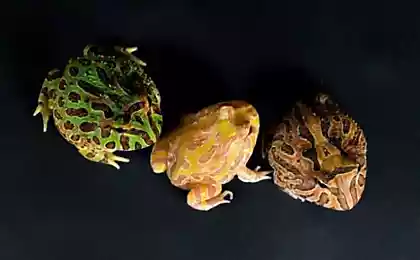1247
You kiss your pets?
It's hard to find a family in which there would be no pets. Most often it is a cat or dog, but there are rodents - hamsters, white mice and rats, guinea pigs, as well as canaries and parrots, aquarium fish, turtles. But, alas, often enthusiastic owners are unaware that contact with the brothers may entail less serious health risks.

Toxoplasmosis. The main carriers of the disease are the representatives of the cat family, who receive its originators - the so-called oocysts - usually rodents. The illness affects the nervous system, muscles, lymph nodes. A particularly dangerous for pregnant women - perhaps infection of the fetus. Therefore, if a cat in the house, even before planning a pregnancy, you should be tested for toxoplasmosis. Treat it with medication, as well as immune and chemotherapy. As a precaution necessary to observe personal hygiene measures and regularly clean litter box.
Felinoz (in common parlance - "cat scratch disease"). Even if the cat looks healthy, her body may be present pathogens of various diseases. If you scratch the animal, germs can get into your blood. There are many cases when a person scratched the cat got blood poisoning, inflammation of lymph nodes, and the treatment was long and difficult, not to mention the danger of life.
Salmonellosis. This intestinal infection can be deadly to humans. Salmonella well take root in the body of cats and dogs.
Helminthiasis (in common parlance - worms). There are several varieties. If you have a cat or a dog, it is very likely that you are infected with worms (helminths). To expel them from the body, it is necessary to make special preparations (animal and give them too). Worms deliver a lot of trouble - abdominal pain, itching in the anus, and more. There are horror stories about the tapeworm - worm that dwells within man grows to enormous size and devours everything that eats people. Of course, this is a great exaggeration, but the signs of the presence of worms need to get tested and take action.
Rabies. This is one of the most dreaded diseases that can "reward" animals. Acute viral infection leads to irreversible damage to the central nervous system. Dispatched usually through bites. If you or your pet bite a cat or dog with signs of rabies (they are easy to recognize: inexplicable rage, protruding tongue, constant thirst, at a certain stage - lethargy), or animal bites seem to you suspicious, you should immediately, without delay, refer to A physician or veterinarian who will prescribe injections.
Psittacosis. The source of the disease may become poultry (usually parrots). Pathogens are chlamydia. Infection occurs through airborne droplets. Affects the lungs and central nervous system.
How to avoid infection from animals?
- Plant a pet, first make sure that he is completely healthy. Require the owners and sellers of the veterinary certificate, or you can show the animal to the vet. Never take an animal in the house, if you feel that it hurts.
- Dogs and cats need time to do all the vaccinations. Even if the animal is not to go out, remember that you yourself can be a source of infection, for example, bringing disease agents on their feet from the street.
- Do not feed the animals raw meat. It is often infected.
- If you walk with the animals, be careful that it does not select food on the street. If the cat eats an infected rodent, it can easily become infected with toxoplasmosis, or other disease, and simultaneously infect you.
- After each physical contact with the animals is necessary to wash your hands.
- If possible, do not kiss a cat or dog and not let it lick your face. Saliva animal may give you an infection. The risk is reduced if your pet vaccinated in advance.
- Cleaning of the apartment is a compulsory using disinfectants, while wearing protective gloves

Toxoplasmosis. The main carriers of the disease are the representatives of the cat family, who receive its originators - the so-called oocysts - usually rodents. The illness affects the nervous system, muscles, lymph nodes. A particularly dangerous for pregnant women - perhaps infection of the fetus. Therefore, if a cat in the house, even before planning a pregnancy, you should be tested for toxoplasmosis. Treat it with medication, as well as immune and chemotherapy. As a precaution necessary to observe personal hygiene measures and regularly clean litter box.
Felinoz (in common parlance - "cat scratch disease"). Even if the cat looks healthy, her body may be present pathogens of various diseases. If you scratch the animal, germs can get into your blood. There are many cases when a person scratched the cat got blood poisoning, inflammation of lymph nodes, and the treatment was long and difficult, not to mention the danger of life.
Salmonellosis. This intestinal infection can be deadly to humans. Salmonella well take root in the body of cats and dogs.
Helminthiasis (in common parlance - worms). There are several varieties. If you have a cat or a dog, it is very likely that you are infected with worms (helminths). To expel them from the body, it is necessary to make special preparations (animal and give them too). Worms deliver a lot of trouble - abdominal pain, itching in the anus, and more. There are horror stories about the tapeworm - worm that dwells within man grows to enormous size and devours everything that eats people. Of course, this is a great exaggeration, but the signs of the presence of worms need to get tested and take action.
Rabies. This is one of the most dreaded diseases that can "reward" animals. Acute viral infection leads to irreversible damage to the central nervous system. Dispatched usually through bites. If you or your pet bite a cat or dog with signs of rabies (they are easy to recognize: inexplicable rage, protruding tongue, constant thirst, at a certain stage - lethargy), or animal bites seem to you suspicious, you should immediately, without delay, refer to A physician or veterinarian who will prescribe injections.
Psittacosis. The source of the disease may become poultry (usually parrots). Pathogens are chlamydia. Infection occurs through airborne droplets. Affects the lungs and central nervous system.
How to avoid infection from animals?
- Plant a pet, first make sure that he is completely healthy. Require the owners and sellers of the veterinary certificate, or you can show the animal to the vet. Never take an animal in the house, if you feel that it hurts.
- Dogs and cats need time to do all the vaccinations. Even if the animal is not to go out, remember that you yourself can be a source of infection, for example, bringing disease agents on their feet from the street.
- Do not feed the animals raw meat. It is often infected.
- If you walk with the animals, be careful that it does not select food on the street. If the cat eats an infected rodent, it can easily become infected with toxoplasmosis, or other disease, and simultaneously infect you.
- After each physical contact with the animals is necessary to wash your hands.
- If possible, do not kiss a cat or dog and not let it lick your face. Saliva animal may give you an infection. The risk is reduced if your pet vaccinated in advance.
- Cleaning of the apartment is a compulsory using disinfectants, while wearing protective gloves























